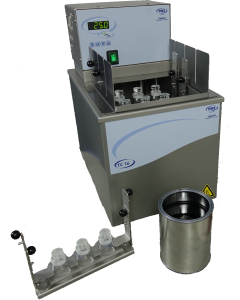Why is it important to know the density of semi-solid Asphalt Binder by pycnometers?
Values of density are used for converting volumes to units of mass, and for correcting measured volumes from the temperature of measurement to a standard temperature using practice ASTM D4311.
Summary of the test method
For the ASTM D70, IP 190 and ISO 3838 test methods the sample is placed in a calibrated pycnometer. The pycnometer and sample are weighed, then the remaining volume is filled with water. The filled pycnometer is brought to the test temperature in a liquid bath, and weighed. The density of the sample is calculated from its mass and the mass of water displaced by the sample in the filled pycnometer.
Why should you use a Tamson liquid bath to determine the density of semi-solid butuminous materials using a pycnometer?
The Tamson TC16 is used as a liquid bath and can be used from ambient +5°C to 250°C. On the TC16 a ridge is mounted to support the adjustable brackets for pycnometers. These brackets can be used for Hubbard or Gay-Lussac pycnometers. Each bracket can accommodate three pycnometers. Maximum three brackets can be placed in one TC16. Either a bracket for Hubbard or for Gay-Lussac pycnometers needs to be bought depending which type of pycnometer will be used. In order to work @ 15°C or @ 25°C an external TLC15-5 circulator needs to be connected.
Please contact our sales team (sales@tamson.nl) to get a quotation. Or visit our webshop to get price and technical information of a Tamson liquid bath and the required accessories and consumables for the determination of the relative density and density of semi-solid Asphalt Binder, asphalt cements, and soft tar pitches by use of a pycnometer conform to ASTM D70, IP 190 and ISO 3838.
